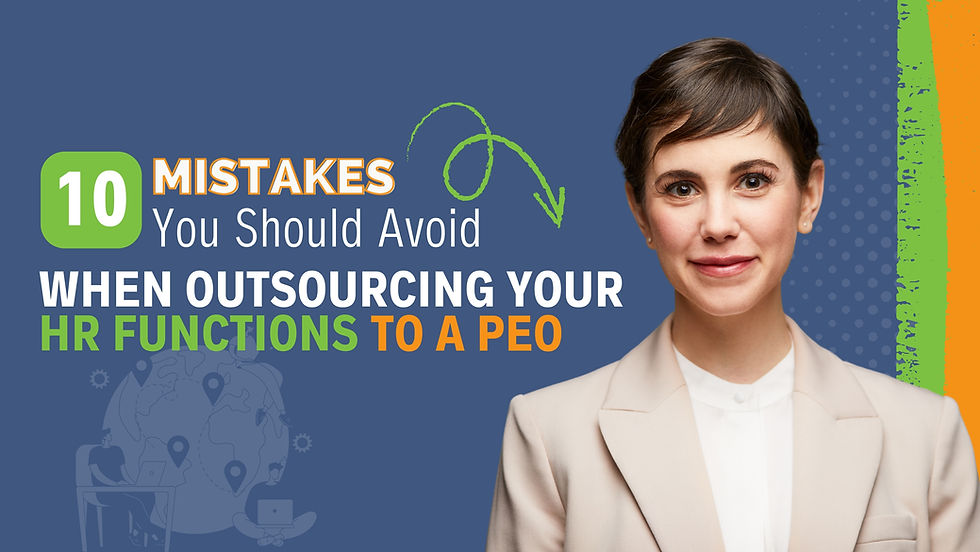Understanding International PEO and How it Can Help Meet Your International Hiring Needs
- Elijah

- Aug 9, 2021
- 4 min read

Within the United States, professional employer organizations (PEO) offer an excellent opportunity for both small businesses and large corporations to engage employees with minimal risks. PEOs provide an easy-to-manage co-employment arrangement for employers of labor within the U.S to manage payroll, taxes, and HR functions. They also help employers stay compliant and avoid regulatory sanctions.
When companies are looking to hire professionals from other countries, the game changes. This is because PEOs are not popular in other climes. In fact, some countries like Switzerland and France consider a co-employment arrangement illegal. It is even more complicated when the international employer does not have an established legal presence in the country where it is looking to hire new employees. For this reason, the concept of international PEO comes into play.
Like local PEO services, international PEO provides an opportunity for employers to source for and legally hire professionals without necessarily going through the hassles and costly expense of becoming a registered entity in the country where the employees are recruited. But this meaning of international PEO is quite different from what actually obtains in this domain. To better represent this model of hiring internationally, another term for international PEO is more often used — global PEO (GPEO) or, preferably, global employment organization (GEO).
The Issue with International PEO
As juicy as international PEO sounds, it is not what it appears to be on the surface. In essence, it is not a system that is sustainable on an overall global scale. Why is this so? Ideally, PEOs offer co-employment arrangements, in which the professional employer organization shares employment liabilities with the client organization. In the international PEO model, the client organization is not even recognized by local law, to begin with. The same applies to the PEO providing the service.
So even if an organization were to find a co-employment partnership with an international PEO organization, it would need to be registered as a legal entity in that country before it can hire anyone. Doing this is often arduous and can take longer than you can wait, especially if you need to hire someone right away. Since co-employment isn’t a hassle-free option on a global scale, it fundamentally compromises the effectiveness of the international PEO structure.
Additionally, the PEO does not take up any employer responsibility, leaving the client company vulnerable to liabilities and possible regulatory sanctions in the local country. In most cases today, when people refer to international PEO, they are often talking about the employer of record or global employment organization (GEO) model. GEO and international PEO are often used interchangeably, but there are striking differences between the two.
How is GEO Better than International PEO?
Unlike PEOs, the Global Employment Organization solution uses an intermediary known as an Employer of Record (EOR). An employer of record is a third-party organization that handles the hiring of employees and all HR administrative duties (contract management, taxes, payroll, and compliance) on behalf of another company.
An employer of record model offers the best and easiest solution for companies to outsource talent internationally without having to set up a legal entity locally. It is still similar to a PEO since it shares the responsibility of HR, payroll administration, and employee management with the PEO. But one significant difference is that the employer of record fully employs the workers in the local country. The process is pretty seamless, and the employees may not even notice the PEO’s role in all of this.
The biggest advantage is that employers can hire professionals anywhere in the world without bothering about setting up a local legal entity. Since the employer of record is already a registered entity in the country where the employee is hired, the main employer is shielded from litigations, tax defaults, and other liabilities. The client organization has the opportunity to strengthen its workforce beyond national borders and can scale internationally without bothering about heavy expenditures and compliance risks.
More Differences Between a PEO and GEO
In order to further differentiate the international PEO terminology from what actually obtains regarding hiring talents across international borders, let’s consider the following instances:
Employment Contract
The employment contract in an international PEO solution is directly between the employer and local employee, while with an Employer of Record intermediary, the employment contract is between the employee and EOR. Then a service agreement exists between the Employer of Record and the client company that is hiring local employees.
Employer Relationship
A PEO enters a co-employer partnership with the employer or client organization and the employer of record. Although the company still carries major responsibilities, the PEO shares part of the liabilities and helps to minimize compliance risks. A GEO solution, on the other hand, employs the worker fully under the Employer of Record, such that the EOR bears all responsibilities, including compliance.
Compliance
The PEO provides a degree of cover to the client company, in that it shields the employer from issues, such as taxation and compliance with local employment policies. The company also carries out its own insurance, as the PEO often does not cover all areas. With an EOR, the agency or client company is fully protected from all risks, including litigations. The EOR’s insurance covers the employee and client company fully.
Entity Registration
With international PEO, clients or agencies cannot bypass the need to register their company in all the foreign countries where they wish to hire new employees. But using an EOR effectively eliminates the need to register in multiple locations since the EOR is already a registered legal entity in those countries.
Are you looking for a solution that allows you to hire and onboard new talents internationally?
What if we told you that hiring internationally doesn’t have to be stressful or crazy expensive at all? At Mission HR, we do not only offer businesses the services and solutions they need to scale internationally.
We also bring our years of experience and rich insight to the table, providing businesses with answers to all their bugging HR and outsourcing needs. Don't hesitate to get in touch with us, if you have further questions about international PEO or hiring employees in other locations.



